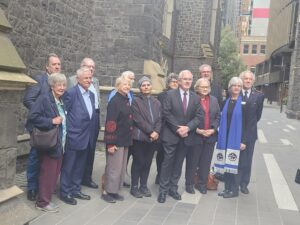
Hannah Craven
27 July 2023
In an everyday act of insidious double speak, the average Australian woman’s size of 16-18 is labelled “plus sized”. Diet drugs like Ozempic are taking off. The fitness and wellness industries are booming.
Eating disorder symptoms rose dramatically during the COVID-19 pandemic, with a high risk of relapse, worsening symptoms, more new diagnoses, and presentations in children younger than ever, according to research recently published in the Journal of Eating Disorders. Presentations increased by 63 per cent during 2020 at the Eating Disorder Service of Melbourne Royal Children’s Hospital.
It’s true that realistic, normal, healthy body sizes and shapes are becoming slightly more visible in stores, advertising, and on TV, but they are barely a drop in the ocean. There are some stand out exceptions, but we all know they are exceptions. Ultimately, thin still wins. My son learns about body-shaming at his high-school. My nine-year-old daughter worries at night that she’s fat.
Read more: Thousands of teenagers hate their bodies, and Christians need to talk about this
We justify it by trying to believe in a straight line between size and health: thin is healthy, fat is unhealthy, thin is good, fat is bad. But in truth the relationship between size and health is much more complex than we make out. And as the statistics cited above reveal, our obsession with thinness is not making us healthier, it is making many of us unwell. The ultra-thin ideal is not about health. It is unrealistic – even impossible – for most people. It damages self-esteem, it reduces our ability to enjoy our own lives, and it promotes unhealthy patterns of diet and exercise. But healthy or not, we’re meant to want to be thin. Or at least – we’re not meant to be OK with being “fat”.
So, what can Christian theology offer to young Australians who find it so hard to feel at home in their bodies?
Unfortunately, the answer is that we’ve often done more harm than good. Christian dieting movements are big business in both the United Kingdom and the United States, with programs such as “Slim for Him”, “Weigh Down Ministries”, the “3D plan” and more.
These movements are less visible in Australian Christian culture, but if all Australian women are swimming in diet-culture then Christian Australian women must be making theological connections and assumptions whether they know it or not. Does God care how much you weigh? What size you are? Is weight and size a Christian moral issue? Have you ever heard a Christian teacher or preacher even approach these questions, apart from a passing reference to his “smokin’ hot wife”?
Read more: Our young people are suffering, we need training to help them
The Evangelical Women in Academia conference in July tackled such questions – along with many other topics often sidelined from mainstream theological reflection. This conference aims to create space for current and aspiring Christian women academics to present, to learn, to ask questions, and to see what’s possible. One benefit of platforming different voices in theology is the inclusion of different experiences and topics historically ignored by the male-dominant tradition. We took part in sessions on architecture, fashion, art, hospitality, medical ethics, disability, climate, global poverty, and creative writing, alongside papers in biblical studies and theology. Throughout, conference interrogated the topic of beauty – its potential and its pitfalls, its place in a world of struggle and need.
Clinical psychologist Dr Jessica Green presented a workshop on the Health at Every Size approach to body image and eating disorder recovery. The Health at Every Size movement recognises that you cannot tell someone’s health by looking at them, or by their weight. HAES is a non-diet approach to body image that promotes health behaviours above weight loss.
Dr Green also reflected on elements of Christian theology and teaching which intersect with women’s experience of disordered eating and body image struggles. While some feminist theologians have done good work on this topic, not much of this has made it to your average Australian churchgoer. The Christian tradition has associated women’s bodies with sin, uncleanness and temptation, while at same time associating women themselves more closely with their bodies, reserving the “rational” – the “life of the mind” – for men. Sexist readings of Genesis 1 and the figure of Eve in particular are the source of many distortions. Eve-Mary typology reinforces the moral dichotomy between “good” women and “bad”, strengthening the association between women’s bodies and sin. For many women, dieting and weight loss are forms of control and self-discipline, and have moral overtones. Theologian Hannah Bacon points out the religious language so often attached to food – temptation, sacrifice, guilt and transgression, “good” foods and “bad” foods, in her work Feminist Theology and Contemporary Dieting Culture.
Read more: Fellow travellers, not solution-providers: How churches can better approach severe mental illness
For me, the notion of my body as “an instrument not an ornament” has been powerful, helping me to shift my focus and to learn to appreciate my body for things other than its appearance. It’s a phrase that comes from the work of US clinical psychologists Lexie and Lindsay Kite.
Fostering gratitude for all the things my body allows me to experience has helped me to “be in it” differently: climbing a hill and taking in the view, running by the river in the early morning light, growing and birthing two babies. During the pandemic I started to exercise outdoors regularly, mostly for the mental health benefits. A bonus has been that now, in my 40s, I am more at ease in my body than ever before. I feel it literally carrying me through each day.
But I also worry that this strategy prioritises function, and marginalises disabled bodies in further ways. It relies on my being able-bodied, which – as John Swinton so helpfully reminds us – is for all of us only temporary. My husband recently had an accident in which he broke both of his collarbones. Suddenly he was severely limited. He could no longer do the things he could previously do. What then?
Graduate student and Melbourne diocese Access and Inclusion Working Group member Elizabeth Culhane presented a workshop at the conference on the topic of disability inclusion. The slogans of the body positivity movement might not just be insufficient, they might also be destructive – only reinforcing the idea that being and feeling beautiful is what counts. Still focused on the external, many versions of body-positivity simply seek to expand the range of bodies which might be objectified.
Dr Green suggests body neutrality as a healthier way forward. Lifting the pressure to feel great about our bodies can help us to feel less bad about them too. So rather than beauty being tied to how you look or what you can do, Ms Culhane proposes an alternate concept of beauty grounded in the inherent worth and dignity of all. This moves beyond a “use based” valuing of bodies altogether, even though some use-based ways of valuing our bodies may be positive for some.
For something that so intimately and fundamentally affects us all, it is strange that theology has only so lately come to reflect on these kinds of questions. I am thankful for the space that Evangelical Women in Academia has given to these topics, and to women’s experience.
For support with eating disorders or body image, contact the Butterfly Foundation on 1800 33 4673.
The Reverend Hannah Craven is associate lecturer in Christian Thought at Ridley College.
For more faith news, follow The Melbourne Anglican on Facebook, Twitter, or subscribe to our weekly emails.







